|
|
|
Sort Order |
|
|
|
Items / Page
|
|
|
|
|
|
|
| Srl | Item |
| 1 |
ID:
119460
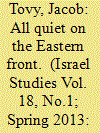

|
|
|
|
|
| Publication |
2013.
|
| Summary/Abstract |
The article reviews and analyzes the measures taken by Israel from the beginning of 1951 until the middle of 1956 in its attempt to extract collective compensation (referred to in Israeli terminology as shilumim and hereinafter as "reparations") from the GDR (East-Germany). Existing research on the subject has revealed that as of yet there has been almost no discussion of it. Only two sources have dealt in a substantive manner with Israel's attempts to obtain reparations from the GDR during 1951-56: Angelika Timm in a sub-chapter to the issue in Jewish Claims against East Germany, and Michael Wolffsohn's article, "Das Deutsch-Israelische Wiedergutmachungsabkommen von 1952 im Internationalen Zusammenhang." However, these two writers analyze the subject only briefly-each devoting only 8 pages to the issue, based on sources cited in some 30 footnotes. In contrast, this article provides an in-depth understanding of the subject, including all the aspects from different perspectives, some of which are not discussed in the above-mentioned writings. First and foremost, the article reviews all of the actions taken by Israel regarding this subject, while focusing on the connection that was made between the two Israeli claims for reparations: from the GDR and from FRG (West-Germany).
|
|
|
|
|
|
|
|
|
|
|
|
|
|
|
|
| 2 |
ID:
112524
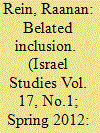

|
|
|
|
|
| Publication |
2012.
|
| Summary/Abstract |
This article analyzes the changing attitudes of the Israeli authorities towards the Jewish veterans of the International Brigades, most of them Communists. Following a brief overview of Jewish participation in general and Jewish Palestinian participation in particular in the Spanish Civil War, we focus our attention first on the initial reactions to the returning volunteers and then on two major events in the process of memory appropriation and gradual inclusion of these fighters in the Israeli national narrative: the 1972 Tel-Aviv conference of Jewish fighters in Spain, sponsored by the Histadrut, and the 1986 speech by Israeli president Chaim Herzog on the 50th anniversary of the outbreak of the Spanish Civil War. Once the fighters' documents were deposited in the archives of the Israel military in the 1990s, the process was complete. Now they could be portrayed as Jewish heroes, national patriots fighting to protect their people and their homeland, Israel.
|
|
|
|
|
|
|
|
|
|
|
|
|
|
|
|
| 3 |
ID:
100676
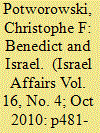

|
|
|
|
|
| Publication |
2010.
|
| Summary/Abstract |
The article explores the possibilities of friendship between Israel and the Pope in the light of Pope Benedict's denial of a reduction of religions to cultural artefacts and his commitment to religious claims to truth. Any discussion of Benedict XVI and Israel must take into account this call for the respect of the human desire for truth, the confidence in the ability of reason, and the validity of religious statements. This article offers some reflections on Benedict XVI's contribution to the larger debate of interreligious dialogue between Christianity and the Jewish faith. After a brief look at Vatican II's Nostra Aetate and at John Paul II, the essay examines some sections of Benedict XVI's Jesus of Nazareth and his first encyclical Deus Caritas est with a view of developing the category of friendship as it applies to his attitude to the faith of Israel.
|
|
|
|
|
|
|
|
|
|
|
|
|
|
|
|
| 4 |
ID:
125665
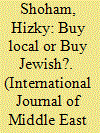

|
|
|
|
|
| Publication |
2013.
|
| Summary/Abstract |
The article explores the Zionist cultural economy in interwar Palestine, by studying the emergence of the field of consumption as an arena for political struggles among Jews and between Jews and Arabs. The Jewish nationalist movement employed dominant contemporary assumptions about economic nationalism in attempts to politicize the economy of British Palestine, including through campaigns advocating ethnonational separatism in consumption. Unlike other "buy local" movements around the world, these were not directed solely against imports; rather, they were often "buy Jewish" campaigns waged against the consumption of commodities produced by the rival ethnonational sector in Palestine. Using a variety of archival and media sources, the article tracks the development of Jewish separatist consumption campaigns in interwar Palestine, uncovering a gradual amplification of their ethnonational emphasis that paralleled the escalation of the Arab-Jewish conflict. The cultural mechanisms used to attribute ethnic qualities to objects and define them as either "Jewish" or "foreign" are analyzed with particular attention to the conceptual contradictions in the definitions of a Jewish product, which were shaped by economic conflicts and the diverse political conceptions of Jewish identity. The study of separatist consumption sheds new light on the "dual society" thesis, revealing the deep grip of separatist approaches across multiple layers of the Jewish middle class in the Yishuv.
|
|
|
|
|
|
|
|
|
|
|
|
|
|
|
|
| 5 |
ID:
192287
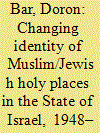

|
|
|
|
|
| Summary/Abstract |
Over the past seven decades, dozens of Muslim holy places in Israel have undergone a process of Judaization, becoming an integral part of the Israeli-Jewish sacred landscape. The current paper compares three waves of Judaization that followed the 1948 and 1967 wars, emphasizing the institutional and popular character of this process. The appropriation of Muslim holy places and their conversion is tied to the political, social, and religious changes that Israeli society underwent during its seventy years of existence. During these decades, Jewish holy spaces gained social, cultural, and religious importance; visiting them became a popular pastime. As the demand for holy places grew, former Muslim sites were converted and became part of Jewish sacred space. The process of transformation took place in parallel on two planes – the institutional and the popular – as both Israeli governmental bodies and worshipers converted Muslim holy places into Jewish sacred sites. The outcome of the process was the expansion of sacred space in the State of Israel and the inclusion of the periphery, which in many cases contained former Muslim holy places, as an integral part of the Jewish map of holy places.
|
|
|
|
|
|
|
|
|
|
|
|
|
|
|
|
| 6 |
ID:
126975
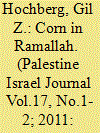

|
|
|
|
|
| Publication |
2011.
|
| Summary/Abstract |
A personal narrative is presented which explores the author's experience of having a short visit to Israel, A contemporary tale of two Israeli citizens whose friendly visit to Ramallah becomes one of Israel's latest successful rescue operations
|
|
|
|
|
|
|
|
|
|
|
|
|
|
|
|
| 7 |
ID:
111225
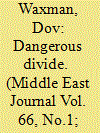

|
|
|
|
|
| Publication |
2012.
|
| Summary/Abstract |
This article examines the relations between Jewish and Palestinian-Arab citizens of Israel since the events of October 2000, when massive Arab protests and riots took place and thirteen Arab demonstrators were killed. In the decade since then Arab-Jewish relations have been characterized by growing mutual mistrust, fear, and hostility. Together with these negative attitudes, political polarization between the two communities has also increased. This poses a serious threat to Arab-Jewish coexistence in Israel and to Israeli democracy itself.
|
|
|
|
|
|
|
|
|
|
|
|
|
|
|
|
| 8 |
ID:
124264
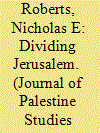

|
|
|
|
|
| Publication |
2013.
|
| Summary/Abstract |
British administrators employed urban planning broadly in British colonies around the world, and British Mandate Palestine was no exception. This article shows how with a unique purpose and based on the promise of a Jewish homeland in Palestine, British urban planning in Jerusalem was executed with a particular colonial logic that left a lasting impact on the city. Both the discourse and physical implementation of the planning was meant to privilege the colonial power's Zionist partner over the indigenous Arab community.
|
|
|
|
|
|
|
|
|
|
|
|
|
|
|
|
| 9 |
ID:
128052
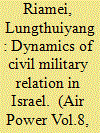

|
|
|
|
|
| Publication |
2013.
|
| Summary/Abstract |
Israel was founded in 1948 in the midst of war and hardship, a period personified by the brave men and women driven by a sense of historic mission to risk everything to protect Jewish lives from assault and military attack. The generation that fought for a Jewish state also had to structure government activities that demand a different kind of boldness in a context tested not by first power but by competing interest goals. Since the creation of the state of Israel, the Jewish population has been defined by military Service. The Israeli citizen was ultimately there to serve in its war against the Arab world, Despite recurrent wars and a perpetual state of alert, Israel has profoundly failed to become a military state. Israel is the only post-World War II democracy in the world that has been in a state of constant war with its neighbours.
|
|
|
|
|
|
|
|
|
|
|
|
|
|
|
|
| 10 |
ID:
130510
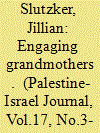

|
|
|
|
|
| Publication |
2011.
|
| Summary/Abstract |
In a small office in the West Bank town of Beit Jallah, just 10 minutes by car from Jerusalem, Tamara Rabinowitz and Siham Abu Awwad sit sipping thick Arabic coffee and finishing each other's sentences. To many in their communities they would seem a very unlikely pair of friends. Tamara, who immigrated to Israel from London in 1960, lost her son Ido in 1987 when he was serving in the Israel Defense Forces in Lebanon. Siham's brother Youssef was shot and killed by an IDF soldier at a checkpoint near their village. Her mother was a Palestinian political activist who served time in Israeli prison, along with three of Siham's brothers.
|
|
|
|
|
|
|
|
|
|
|
|
|
|
|
|
| 11 |
ID:
130802
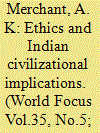

|
|
|
|
|
| Publication |
2014.
|
| Summary/Abstract |
The major civilizations of in human history have been associated with the major religious systems. Some
3,000 years ago Zoroastrianism was the religion of the "glory of ancient Persia," - the Persia that conquered" Babylon, Palestine, Egypt, and the Greek city-states. A few centuries later Judaism was the basis of Hebrew culture, which some philosophers such as Karl Jaspers regards as the greatest in history. And Jewish law has formed the I basis of common law and jurisprudence in countries all over the world. Western culture, until the rise of modem science, was dominated by Christianity. The teachings_ of Islam that burst upon world stage some 1400 years a go preserved and developed the Hellenistic heritage and gave algebra and other sciences. It was probably the greatest civilization the world had seen until the rise of the - Industrial Revolution began to transform Western culture. Today, the tumult of our age of transition is characteristic of the impetuosity and irrational instincts of youth. its follies, its prodigality, its pride, its self- assurance. its rebelliousness, and contempt of discipline.
|
|
|
|
|
|
|
|
|
|
|
|
|
|
|
|
| 12 |
ID:
092290
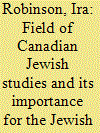

|
|
|
| 13 |
ID:
113997
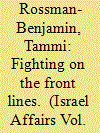

|
|
|
|
|
| Publication |
2012.
|
| Summary/Abstract |
Members of Muslim and pro-Palestinian student organizations and anti-Zionist faculty are the two main sources of anti-Jewish bigotry at the University of California (UC), and their behaviour has had two primary effects: the anti-Semitic language and imagery used by these individuals has caused significant harm to the reputation of Israel and its supporters, both on and off campus; and their behaviour has created a hostile and threatening environment for many Jewish students on UC campuses. Efforts to address the problem of anti-Semitism on UC campuses have generally targeted one of these two effects. These efforts have included: the reactive and proactive campaigns of pro-Israel student and faculty groups, as well as attempts to secure the protection of Jewish students from anti-Semitic harassment through legal means and by applying grassroots pressure on UC administrators. Although none of the efforts has led to a substantial reduction of anti-Semitism on UC campuses, a few of the approaches show some promise.
|
|
|
|
|
|
|
|
|
|
|
|
|
|
|
|
| 14 |
ID:
124523
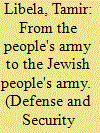

|
|
|
|
|
| Publication |
2013.
|
| Summary/Abstract |
The article discusses processes of “religionization” within the institutional identity and ethos of the Israel Defense Forces (IDF) and the connection of these processes with the significant structural changes the IDF has undergone in recent decades. The main argument presented is that since the late 1980s, the IDF has been in a culture conflict, torn between soldiers and civilians who advocate turning the IDF into a professional army “military professionalization,” and others who wish to preserve, and even strengthen, the “people's army” model. The present article shows that the meaning of the term “people” in this phrase has shifted to refer strictly to the Jewish people, and that a national-ethnic perception strongly influenced by religious-national ideology has been adopted.
|
|
|
|
|
|
|
|
|
|
|
|
|
|
|
|
| 15 |
ID:
130505
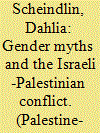

|
|
|
|
|
| Publication |
2011.
|
| Summary/Abstract |
Israeli society has distinct and complex gender roles, and the identities of both men and women are largely derived from militaristic socialization and a wartime mentality. Yet these has not been extensive systemic research comparing the attitudes of men and women toward the Israel-Palestine Conflicts.
|
|
|
|
|
|
|
|
|
|
|
|
|
|
|
|
| 16 |
ID:
131858
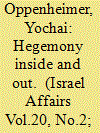

|
|
|
|
|
| Publication |
2014.
|
| Summary/Abstract |
This article examines the political protest expressed by Nathan Alterman over the years in poems published in the newspapers. It argues that this criticism identifies with the hegemonic political values rather than articulate alternative ones, in an attempt to nurture self-criticism on the part of the government regarding its failures and mistakes. This type of criticism seeks to preserve the reigning hegemony from within and to ensure that it projects an image of moral rectitude.
|
|
|
|
|
|
|
|
|
|
|
|
|
|
|
|
| 17 |
ID:
129197
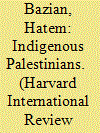

|
|
|
|
|
| Publication |
2014.
|
| Summary/Abstract |
On November 10th, 2013, the Israeli cabinet voted in a special session to authorize the demolition and removal of Umm al-Hiran, an "unauthorized," Palestinian Bedouin village in the Negev Desert, and to build in its place a new community for national Jews to be named Hiran, which had been planned and approved in early 2002. The stated reason for this demolition and forceful eviction is the lack of permits for the existing settlement, with Umm al-Hiran being one of a number of Palestinian Bedouin communities that were settled without permits and are currently subject to intense Israeli plans for removal. Umm al-Hiran itself was set-up in early 1956 by the Palestinian Abu-Alkian tribe after they had been forced to move from their ancestral tribal lands near Kibbutz Shoval in the Northern Negev.
A more critical development related to this event is the Israeli Parliament's passing of the first reading of the Prawer law. If the plan wins final approval, as it appears it will, it would cause the forceful displacement of 40,000-70,000 Arab Bedouins from the Negev, the confiscation of 800,000 dunams of Arab land, the razing to the ground of 36 or more Arab villages, and the dispossession of another generation of Palestinians. According to Adallah, the Legal Center for Arab Minority Rights in Israel, the "underlying premise of the draft bill is that there is no Bedouin land ownership," effectively negating the "population's right to property and historic affinity to the land." At the heart of this matter is the ongoing contestation of Palestinian land rights, with the Israeli government using its authority to define these policies to favor the Jewish population over the Arab. Thus, this bill, like others before it, "promotes the principle of segregation along the lines of ethnic affiliation and labeling."
|
|
|
|
|
|
|
|
|
|
|
|
|
|
|
|
| 18 |
ID:
124360
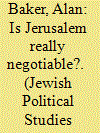

|
|
|
|
|
| Publication |
2012.
|
| Summary/Abstract |
On August 21, 2012, Palestinian Authority leader Mahmoud Abbas, referring to "the alleged [Jewish] Temple" in Jerusalem, stated that "there will be no peace, security, or stability unless the occupation, its settlements and settlers will be evacuated from our holy city and the eternal capital of our state."1 This statement, basically denying any Jewish linkage or right to Jerusalem, uttered by the head of the Palestinian Authority who is considered in the international community to be moderate and reasonable, serves as an example of the tremendous political, historical, psychological, legal, and religious challenge that the issue of Jerusalem poses to the Middle East negotiating process. This study analyzes the various aspects of this challenge, with a view to determining why a resolution of the Jerusalem question has defied all past negotiators, raising serious questions about the possibility of reaching agreement between the parties regarding Jerusalem. Beginning with a brief summary of the significance of Jerusalem to each religious community as well as to the world at large, this study analyzes the various international instruments making reference to Jerusalem, and lists proposals published over the years for solving the issue of Jerusalem.
|
|
|
|
|
|
|
|
|
|
|
|
|
|
|
|
| 19 |
ID:
182892
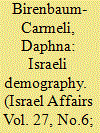

|
|
|
|
|
| Summary/Abstract |
With a fertility rate twice higher than the OECD average, Israel is a world outlier in terms of fertility. This article puts together a composite portrait of this exceptional reproductive landscape. Within a comparative framework, it offers context-specific illustrations showing that considered vis-à-vis women in the Former Soviet Union (FSU) and Jewish FSU immigrants to the U.S., FSU immigrants to Israel had higher fertility. Inside Israel, all non-Jewish women have decreased their fertility rate in the past two decades, whereas Jewish women of all strata, but ultra orthodox women, have increased their fertility rate. Given the material challenges of child-rearing in Israel, the article concludes with some questions and preliminary answers regarding Israel’s exceptional fertility rates.
|
|
|
|
|
|
|
|
|
|
|
|
|
|
|
|
| 20 |
ID:
119472
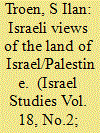

|
|
|
|
|
| Publication |
2013.
|
| Summary/Abstract |
T he J ewish claim to the L and of I srael (E retz I srael) is a very large topic with a historical pedigree thousands of years old. These claims were long rooted in a Jewish peoplehood as defined in a religious culture until the growing secularization of Jews during the 19th century shifted claims from an exclusively religious basis to one that incorporated increasing reliance on secular concepts, particularly nationalism with its demand for a polity. This was just as well since in the contemporary world, religiously-based claims are viewed as parochial. Secular claims are more generally considered universal and therefore appropriate for public debate. In other words, claims rooted in a religious tradition may be effective when directed to fellow-believers; claims expressed in secular terms are more acceptable in extra-communal discourse. Thus, claims to Eretz Israel or Palestine that rely solely on the Covenant between God and the Jews or on the status of Palestine as a Waqf may persuade Jews and Muslims respectively, but have lesser effect when brought to courts of public opinion and the academy.
|
|
|
|
|
|
|
|
|
|
|
|
|
|
|
|
|
|
|
|
|